“Oh. That would be awful.” She eyed me. Silence. My hand was there on the seat between us, and she touched it. “It was your suggestion,” she said.
“Ouch,” I said. “But so it was. Okay. As you may know, I live where I work, in Nero Wolfe’s house. There’s a room above his on the third floor which we call the south room. It has a good bed, two windows, its own bath, hot and cold running water, a Kashan rug fifteen by eleven, and a bolt on the door. The best cook in New York, Fritz Brenner, would get your breakfast, which you could eat either from a tray in your room or in the kitchen with me. His sour milk griddlecakes are beyond any—”
“But I couldn’t,” she blurted. “I might have to stay... I don’t know how long...”
“It’s cheaper by the month. We’ll take it out of the twenty-two grand. Anyway, you couldn’t pay a hotel bill, you’ve even sold your jewelry. Of course you’ll never live it down, shacking up with three unmarried men, and one of them a Frenchman, but you can’t sleep in the park.”
“You’re making a joke of it, Archie. It’s no joke.”
“The hell it isn’t. That a girl wearing a ten-thousand-dollar coat, with her own bed in a sixteen-room Fifth Avenue apartment, with a flock of friends so-called, with credit in any hotel in town, needs a safe place to sleep? Certainly it’s a joke.”
She tried to smile and nearly made it. “All right,” she said. “Some day maybe I can laugh at it. All right.”
I got out and headed for the drugstore to get the hackie.
At a quarter past nine Tuesday morning, seated with Sally at the side table in the kitchen, I passed her the guava butter for her third griddlecake. I had told her the household morning routine when I had taken her and the suitcase up to the south room an hour after midnight — Wolfe, breakfast in his room at 8:15 from a tray taken up by Fritz, and to the plant rooms at nine o’clock for two hours with the orchids; and me, breakfast in the kitchen whenever I got down for it, no set time, and then, unless there was an outside errand, to the office for dusting, putting fresh water in the vase on Wolfe’s desk, opening the mail, finishing with the morning Times if I hadn’t done so at breakfast, and performing whatever chores were called for.
Wolfe had done pretty well, for him. He had been at his desk with African Genesis when I had entered with Sally at eleven-thirty, and at least he hadn’t got up and marched out when I announced that we had a house guest. After a growl and a couple of deep breaths he had put his book down, and when I asked if he wanted just a summary or the whole crop, verbatim, he said verbatim. It’s more satisfactory to report a lot of conversation in the presence of someone who was in on it, just as a kid named Archie, years ago out in Ohio, got a bigger kick climbing to the top of the tree if a girl was there watching. Or fifteen or twenty girls. When I was through and he had asked a few questions, he told the client about the caller we had had earlier in the evening, Ernst Hausman, her godfather — not verbatim, but the gist of it. The end of that was for me too, since the phone call from Sally had come just as Wolfe was conjecturing that Hausman had put the arsenic in the chocolate himself. He had not broken down and confessed. After a few rude remarks he had got up and gone.
Wolfe had had no instructions and no comments before going up to bed.
The Times had a two-inch paragraph on page twenty-seven, saying that Archie Goodwin had told a Times reporter that Nero Wolfe had been retained in connection with the Jerin murder case, but that Daniel Kalmus, Matthew Blount’s attorney, had stated that he had not engaged Wolfe’s services and he doubted if anyone had.
At breakfast Sally and I had decided a) that it was desirable for her mother to know where she was, b) that she would phone to tell her, c) that she would go out and around at will but would be in her room at eleven o’clock, in case Wolfe wanted her when he came down from the plant rooms, d) that she would help herself to any of the books on the shelves in the office except African Genesis , e) that she would not go along when I walked to the bank to deposit the twenty-two grand, and f) that she would join us in the dining room for lunch at 1:15.
I was at my desk at eleven o’clock when the sound came of the elevator, which Wolfe always uses and I never do. He entered, with the day’s desk orchids as usual, said good morning, went and put the branch of Laelia gouldiana in the vase, sat, glanced through the morning mail, focused on me and demanded, “Where is she?”
I swiveled. “In her room. Breakfast with me in the kitchen. Good table manners. She phoned her mother to tell her where she is, went to Eighth Avenue to buy facial tissues because she doesn’t like the brand we have, returned, and took three books from the shelves with my permission. I have been to the bank.”
He left his chair and went across to the shelves for a look. I doubt if he could really tell, from the vacant spaces among the twelve hundred or so books, which ones she had taken, but I wouldn’t have bet on it either way. He went back to his desk, sat, narrowed his eyes at me, and spoke. “Not another coup for you. Not this time.”
“Maybe not,” I conceded. “But when Mrs. Blount said you could keep whatever her daughter had paid you it looked ticklish, so I spilled it. Or do you mean my telling Kalmus?”
“Neither one. I mean your bringing her here. You did it, of course, to press me. Pfui. Knowing I would sooner have a tiger in my house than a woman, you thought I would—”
“No, sir. Not guilty.” I was emphatic. “I start pressing, or trying to, only when you’re soldiering, and you’ve had this only twenty-four hours. I brought her because if she went to a hotel there was no telling what might happen. She might cave in. She might even lam. I told Mrs. Blount you only keep money you earn. It would be embarrassing not to have the client available to return the fee to when you decide you can’t earn it. I admit you have stirred up some dust by having me toss it to Lon Cohen, you even got an offer of fifty grand from maybe the murderer, but what next? Hope for a better offer from one of the others?”
He made a face. “I’ll speak with Miss Blount after lunch. I must first see them — Mr. Yerkes, Mr. Farrow, Dr. Avery, and, if possible, Mr. Kalmus. It may not be—”
“Avery wasn’t a messenger.”
“But he was at the hospital with Jerin until he died. He told Mr. Blount that even at the Gambit Club he had considered the possibility of poison and looked around; he had gone down to the kitchen. If there is any hope of getting—”
The doorbell rang. I rose and went to the hall for a look through the one-way glass panel in the front door, stepped back into the office, and said, “More dust. Cramer.”
He grunted. “Why? He has his murderer.”
“Yeah. Maybe for Miss Blount. To take her as an accessory.”
“Pah. Bring him.”
Going to the front, I took a couple of seconds to observe him through the one-way glass before opening the door. With Inspector Cramer of Homicide West there are signs I am familiar with — the set of his broad burly shoulders, the redness of his big round face, the angle of his old felt hat. When it’s obvious, as it often is, that he intends to dingdong, I open the door a crack and say something with a point to it, such as, “A man’s house is his castle.” But that time he looked fairly human, so I swung the door wide and greeted him without prejudice, and, entering, he let me take his coat and hat, and even made a remark about the weather before proceeding to the office. You might have thought we had signed up for peaceful coexistence. In the office, of course he didn’t offer Wolfe a hand, since he knows how he feels about shaking, but, as he lowered his big fanny onto the red leather chair, he said, “I suppose I should have phoned, but you’re always here. I wish to God I could always be somewhere. What I want to ask, the Jerin case. Matthew Blount. According to the papers, you’ve been hired to work on it. According to Goodwin.”
Читать дальше

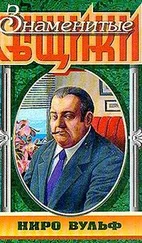
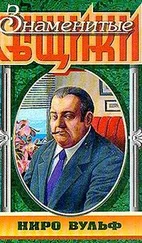

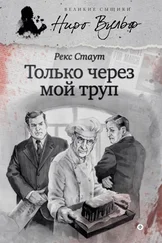

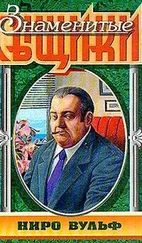
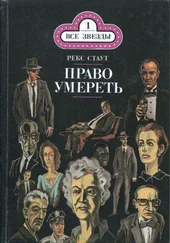
![Рекс Стаут - Лига перепуганных мужчин [litres]](/books/394342/reks-staut-liga-perepugannyh-muzhchin-litres-thumb.webp)